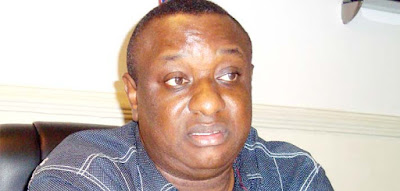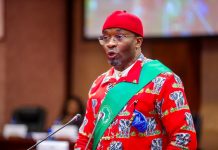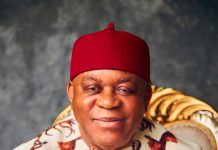I read the opinion of Mr. Festus Keyamo (a very respected advocate and human rights activist) as advertised in the Sun newspaper. If this had been a mere news report I would have ignored it, but going by the way the matter was advertised and the fact that it concerns my own state, Abia State, I am compelled to respond. Keyamo is from Delta State and is not more affected about this raging controversy than my humble self.
My sincere view after reading the said opinion is that it is very clear that Mr. Festus Keyamo, a senior member of the Bar, is not well seised of the facts of the matter before he delved into same. It appeared to me like a case of where one is paid to blow another’s trumpet, but having known Mr. Keyamo very well, I know this my suspicion is very wrong. The primary object of my reaction is to ensure that more people are not misled by his position.
First, Keyamo does not seem to understand the Ikpeazu v. Ogah matter. The case was not predicated on meeting the conditions of INEC as he said but that of the Peoples’ Democratic Party (PDP) for primary election. The Peoples’ Democratic Party (PDP) Electoral Guidelines 2014 did not say that a Candidate at an election must show evidence of Tax paid as and when due, which is what he assumed. Rather, Article14 and 14(a) simply required a candidate to showevidence of Tax payment. Dr. Okezie Ikpeazu fully complied with this provision by attaching evidence of his tax payment and his party was satisfied with that and consequently returned him as its candidate for the Governorship election. For ease of reference, the Article provides as follows:
“An aspirant to the gubernatorial primary election shall not be qualified to be nominated or contest the primary election if he/she;
fails to produce his personal income tax certificate or any evidence that he has paid his income tax for the preceding years or evidence of exemption from payment of personal income tax.”
Notwithstanding the above quoted provision, Hon. Justice Abang on page 87 of his Judgment held as follows:
“The 2nd Defendant ought to have forwarded the monthly payslip or pay advice to Independent National Electoral commission to show that he paid his tax AS AND WHEN DUE(emphasis ours). If as contended by him that he is a public servant or civil servant which is in doubt then the information in the plaintiff’s exhibits A to D cannot be correct”
This is an error of Justice Abang in that he misconstrued the issue as being one for determination of whether Ikpeazu paid his tax as and when due. Unfortunately, Keyamo fell into the same pit of error.
Uche Ogah challenged the decision of the PDP to return Ikpeazu as its Governorship candidate in court by way of originating summons. It was part of Dr. Ikpeazu’s case that originating summons procedure was not appropriate for the matter as the circumstances of the issues raised required parties leading evidence in proof of his respective contentions. The trial court did not accept this argument, reasoning that allegation of forgery was not raised in the case. Yet the same court in its final verdict, without hearing evidence went to a great length to scrutinise the said tax papers, making findings that amounted to concluding that the documents were false. The Court narrowed the issue to one of True or False and nothing more vis:
“The nature of document to be false under section 31(5) of the Electoral Act was not the issue in that matter. Therefore, it does not require in my view ordering of pleadings or requiring the plaintiff to proof the allegation beyond reasonable doubt. The issue here is simple and straightforward, whether there is any false information contained in the documents submitted to Independent National Electoral Commission by the 2ndDefendant….for the upteempth time, the issue before the Court is whether on the face of these documents, information in exhibits A to D and H of the Plaintiff’s affidavit are correct or false NO MORE NO LESS.” (emphasis ours)
I must ask here: “What is the distinction between ‘a false document’ and one ‘containing false information’? To me it is a distinction without a difference.
While stating that Uche Oga’s case did not raise issue of forgery and at the same time making findings on the falsity of the documents attached to his affidavit evidence, the trial court forgot that the definition of a forged document under our criminal code is a document which is false or that tells lie about itself.
It is clear that the originating summons procedure adopted by the trial court shielded Dr. Ogah’s claim from proper scrutiny, which proper leading of evidence at trial would have afforded with a view to ascertaining the truth on the issue of whether the document actually contained false information. On the guise that issue of forgery was not raised, the court refused to order pleading and go to trial, yet it went ahead to make findings which amounted to in fact saying that the document was forged. This is clear miscarriage of justice.
I had expected Mr. Keyamo, if he had read the judgment, to immediately discern this error which is apparent, but he failed to do so. I still believe that Keyamo has not read that judgment. With his experience, he ought not to defend a position that he is not familiar with as in this case.
It must be noted that it is these same tax papers that a sister Federal High Court Judge has held in the case ofFHC/OW/CS/191/2015 Sir Friday Nwanozie Nwosuv. PDP & ORS (un-reported) that they were not forged. This should have sent a signal to Mr. Keyamo. That case in which Dr. Uche Ogah was also a party was in fact filed before Dr. Uche Ogah’s case.
To the Court in its judgment in Ogah v. Ikpeazu case, the affidavit which is a prototype document is false for the reason adduced therein by the Honourable Judge. See pages 71-90 of the Judgment. One of the major reasons is to the effect that the Tax receipt was dated on a Saturday and also that since the tax for one of the certificate for years was from two different establishments in which he was occupying offices at the time, it would have been excusable if he had explained that in Form CF001 which he submitted to INEC. For God’s sake, there is no provision for such explanation in the form and also that it was not explained in that document should not be the reason why court would not afford Dr. Ikpeazu the opportunity of giving that explanation at trial. If the Court wanted clarification as it said, it should have allowed evidence to be called as raised in one of the numerous objections to originating summons procedure by the Lawyers to Ikpeazu, which the Court turned down and said it was an afterthought designed to cover false information given by him to INEC. Rather the Court suo motuwent on a forensic examination of the documents and making findings on them after depriving itself of the benefit of hearing evidence on them before making such findings. As stated by the Supreme Court in IKPEAZU V. OTTI (2016)8 NWLR (Pt.1513) pg 107 paras F-H per Kekere-Ekun J.S.C:
“It would amount to a Court descending into the arena of conflict if it were to conduct a private investigation of documents not properly demonstrated before it….”
The trial court should have afforded the parties of the opportunity of a trial on these facts before making its conclusion on the matter. This is what it did not do and which Dr. Ikpeazu has submitted to the higher court for a review.
The opinion of Mr. Keyamo, the way it was expressed, amounted to usurpation of the authority of the Court of Appeal to review the complaints of Dr. Ikpeazu against the decision of Justice Abang. Keyamo in his said publication has ruled that all the efforts of Dr. Ikpeazu’s lawyers in appealing and filing stay of execution and injunction pending appeal are all null and void. This to me is absurd and reprehensible.
Second, in case Keyamo is not familiar with the case laws, we refer him to case of VASWANI TRADING CO. V. SAVALAKH 12 SC 77 with respect to effect of action taken while a motion for stay of execution and injunction is pending. INEC and Dr. Uche Ogah had previously denied being served with Notice of Appeal and application for stay of execution prior to issuance of the so called certificate of return to Dr. Ogah, but it has been revealed that they were duly served with these processes. By the authority of the Vaswani case, filing of Notice of Appeal with a motion for stay of execution and injunction operates as a stay until determined one way or the other by the appellate court. What actually amounts to a nullity is any action taken either by the lower court or the parties with a view to circumventing the eventual decision of the appellate court. In this wise, since INEC was served with the Notice of Appeal together with the motion for stay of execution and injunction, INEC ought not to have issued Dr. Ogahwith a Certificate of return and in fact the certificate of return purportedly issued in the circumstance is null and void.
Is Keyamo trying to say that Ikpeazu has no right of Appeal under the Law and that while making an appeal to a higher court, he does not have the right to ask for stay of execution?
Assuming that section 143 of the Electoral Act applies to election petition only as postulated by him (which is denied), what then applies to pre-election matters? For his information, since he preferred not to know, the provisions of Section 241 of the Constitution of the Federal Republic of Nigeria 1999 (as altered) and Section 24(2)(a) of the Court of Appeal Act apply to this case. This means that Ikpeazu has three months within which to appeal against the Judgment of Hon. Justice Abang. Either way, whether under section 143 of the Electoral Act 2010 or section 241 of the Constitution or Section 24(2)(a) of the Court of Appeal Act, Dr. Ikpeazu has a right of appeal and to ask for stay while he stays in office pending the final determination of the case by the appellate Courts, in this case by the Court of Appeal and eventually the Supreme Court since both parties would like to explore the avenue of appeal to the highest Court of the land.
The haste with which INEC issued the Certificate of Return to Dr. Ogah within 24 hours of the delivery of the Judgment is alarming and unprecedented in its history. It is also contrary to the rule of law in operation under our jurisprudential regime where aparty’s right of appeal is not meant to be stifled in any way. That is why the Supreme Court in the very recent case of IKPEAZU V. OTTI (2016)8 NWLR (Pt 1513) pg 38 at 83 deprecated the Order of the Court of Appeal in the case with regard to the use of the word ‘forthwith’ . According to Galadimma J.S.C:
“In the instant case, by ordering the 4thRespondent to issue a certificate of return to the 1st Respondent forthwith, the Court of Appeal usurped the constitutional and statutory duty of the 4th Respondent. By the order, the constitutional right of appeal of the appellant was automatically foreclosed”.
This same error was repeated by Justice Abang in this case and it was based on this erroneous order that INEC claimed to have acted in issuing the certificate of return which Mr. Keyamo is defending. Going by this quoted judgment of the Supreme Court, Keyamo’sposition on this matter is very wrong. Let the whole word know that Ikpeazu is acting within the Law and all his action remains valid as a Governor sworn into office to administer Abia State on the 29th of May 2015 and this was subsequently affirmed by the Supreme Court of Nigeria in the aforecited case.
The Federal High Court is a court of first instance and not the final court of appeal in the country, hence its Judgment is not final.
It is not sacrosanct and should not be treated as such as Mr. Keyamo wants the world to do.








